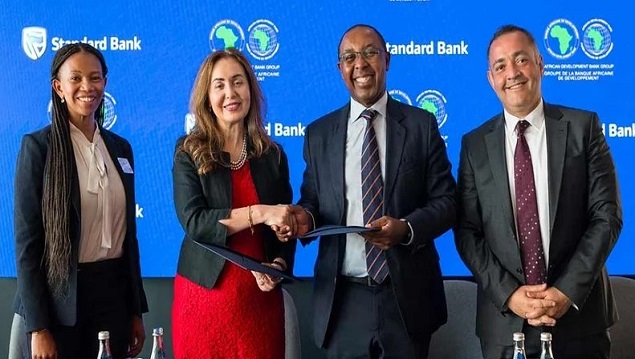E-Financial
Nigerian Economy expands in 2018; Presidential elections loom

By Jameel Ahmad, FXTM Global Head of Currency Strategy and Market Research,
Confidence over the health of the Nigerian economy was slightly elevated this morning after official reports showed that economic growth expanded in 2018.
Gross domestic product in Africa’s largest economy rose 1.93% last year, compared to the tepid 0.8% in 2017. With fourth quarter economic growth also printing stronger than expected at 2.38% in real terms YoY, Nigeria seems to be gaining economic momentum. However, with the nation’s fortunes still closely linked to Oil markets, growth could be threatened this year if Oil prices continue to depreciate.
It will be a monumental week for the Nigerian markets as presidential elections loom. Although the Naira was stable against the Dollar yesterday at N358 in the parallel markets, there could be some volatility this week due to election uncertainty.
USD rally takes investors by surprise; but will the winning streak be able to continue?
A key overhang for the Dollar may be clearing up after US lawmakers announced they have a deal in principle to avoid another US government shutdown this weekend. However, President Trump’s approval is still required before the spending bill can go through.
At the time of writing, the DXY is holding marginally close to 97, having posted gains over the last eight consecutive days – its longest winning streak since 2016. This recent run of form certainly goes against initial expectations for muted Dollar strength this year given the Federal Reserve’s recent U-turn on US monetary policy.
There is a likelihood that central bank policy in the form of the Federal Reserve is not the catalyst behind the USD rally. It probably doesn’t have anything to do with the U-turn from the Fed a few weeks ago either. Investors are possibly thinking that “no news” when it comes to the ongoing US-China trade talks is not necessarily an example of “no news is good news” for this environment of trade tensions. The threat can’t be understated that the United States will pull the trigger on extra trade tariffs on Chinese goods at the beginning of March. We saw throughout the second half of 2018 that market anxiety over trade tensions pushed the Dollar higher against its global counterparts, and it wouldn’t be that much of a surprise if recent history repeats itself – if there is another escalation in the trade tariff world.
According to the Bloomberg terminal, spot returns for G10 currencies against the stronger Dollar since January 30 have experienced a clear sea of red in favour of the USD. This is following the euphoria that was created when Fed Chair Jerome Powell signalled the need for “patience” when it comes to the potential of hiking interest rates in the United States.
(Source: Bloomberg Terminal)
What else is driving the Dollar train higher?
Another perspective on what could potentially be driving the USD higher is the lure towards the Greenback being amplified by ongoing praises for the US economy. At the same time, it has become a strain to market headlines that counterparts to the United States throughout a range of developed and emerging markets are highlighting downside risks to their respective economies.
Those who are fatigued from yo-yo trade headlines in the market might be inclined instead to align their mindset to the return of economic and central bank divergence between the United States, and pretty much everywhere else. This ultimately supports the prospects of a stronger Dollar.
What data to look out for next and what could this mean to interest rate policy?
Markets will look to this week’s US January CPI reading as the next test of the Fed’s data dependence. Following that, attention will turn to next week’s release of the FOMC January 30 meeting minutes for potentially further clues on what could have encouraged the Fed’s recent pivot.
The current stance on US interest rate policy is expected to, in turn, allow other central banks to take a pause on tightening monetary policy. With central banks worldwide either standing pat or moving towards another round of a potential easing bias, investors may have less impetus to part with their current darling, the Dollar.
The dovish outlook on global monetary policy, coupled with further positive indicators of US economic strength, should support the Dollar’s attractiveness and this could mean DXY returning to its recent high of 97.54 achieved in November 2018.
Remember a positive conclusion to trade talks would be seen as Dollar-negative
However, this isn’t to say that demand for the Greenback will continue unabated in the near term. Traders should not be looking at the USD as one-way traffic going higher up the charts by any means.
While the US government shutdown may have been averted, markets are also having to contend with this week’s crucial talks in Beijing surrounding US-China trade tensions. Both countries are nearing the end of the 90-day truce and in the event that President Trump pushes through with hiking tariffs on Chinese goods come March 2, that will be seen as a potential trigger to give the US dollar another leg up.
Although given the political and economic pressures that are at risk of creating headwinds to the world’s two largest economies, markets are holding out hope that a deal would be struck sooner rather than later. This would be viewed in the market as a potentially Dollar-negative outcome.
Should key deals be approved in Washington (to fund the US government) and in Beijing (to avert a tariff hike), these will be viewed as the catalysts for risk-on sentiment to return to the fore. Meaning that this would be a significant driver behind potentially higher global equity markets, improved demand for emerging markets and commodities like Oil.
It would however be seen as a risk to the relentless Dollar rally that has taken place over February.
Where do Emerging Markets stand in the currency environment?
Yet amidst this winning streak against G10 currencies, the US dollar has seen mixed results against emerging-market currencies during the same period.
(Source: Bloomberg Terminal)
Some of these EM currencies that posted gains against the Greenback are coming back from oversold positions last year, and are supported by factors such as resilient domestic economic fundamentals, foreign fund inflows, and rebounding commodity prices.
However, EM currencies are still exposed to major events that can sway global risk sentiment, such as US-China trade tensions, Brexit uncertainties, and slowing global growth. China’s moderating economic conditions remain a major overhang for the global growth narrative, and the slowdown may be felt in many emerging economies via the trade and FX channels.
Ultimately, EM currencies will likely be dictated primarily by the broader US dollar theme, and whether the Greenback can build on its one percent climb so far in 2019.
E-Financial
Firm Plans Digital Platform for Easy Access to Loans

Financial services firm, Spring Sky Finance Company is set to launch its digital banking services in Nigeria this week.

A statement by the company noted that this innovative initiative aims to streamline loan processing and enhance access to credit for businesses and individuals, thereby mitigating economic challenges.
According to Dr. Helen Oritsejafor, the chairman of the company, “the institution is driven by innovation and a commitment to empowering individuals, businesses, and communities”.
Oritsejafor emphasised that the finance company is dedicated to providing innovative financial solutions, focusing on customer-centric services that cater for both businesses and individuals.
“Our mission is to empower individuals, businesses, and communities to soar to new heights through innovative financial solutions. We aim to bring banking closer to home with our digital banking architecture, providing financial services to macro and micro-economies,” Oritsejafor stated.
She added that the company’s goal is to become a leading provider of financial services for macro, micro, and small business clients.
“With a strong focus on financial inclusion, Spring Sky Finance seeks to provide tailored solutions to businesses and individuals, enabling them to achieve financial security, build wealth, and realise their dreams,” Oritsejafor said.
She concluded that the company’s digital banking solutions are a key part of its strategy to enhance accessibility and efficiency.
“At Spring Sky, we lead, and others follow. We are positioned to redefine the banking landscape by providing flexible, technology-driven financial solutions that cater for the evolving needs of businesses and individuals in both micro and macroeconomic sectors,” Oritsejafor concluded.
E-Financial
AfDB, Standard Bank Unite to Support SMMEs and Boost Trade

The African Development Bank Group and Standard Bank Group (SBG) on Monday signed a landmark financial agreement to enhance funding for small, medium, and micro enterprises (SMMEs) and expand trade across Africa.

The agreement includes a R3.6 billion investment in a social bond and a $200 million Risk Participation Agreement (RPA) for Standard Bank of South Africa Limited (SBSA). This initiative strengthens Standard Bank’s lending capacity, ensuring greater access to finance for SMMEs, a critical driver of economic growth and job creation in South Africa.
The social bond investment promotes inclusive economic development, particularly for SMMEs with a turnover below R300 million and loan sizes under R40 million. This financing will support up to 4,000 businesses, helping them scale operations, create jobs, and contribute to economic resilience.
Kenny Fihla, Deputy Chief Executive Officer of Standard Bank Group and Chief Executive Officer of SBSA, welcomed the investment, stating: “This landmark partnership strengthens our ability to support SMMEs, the backbone of South Africa’s economy. With approximately 3.2 million SMMEs accounting for 60% of jobs, ensuring access to finance is crucial. This initiative aligns with our Sustainable Finance Framework and our commitment to financial inclusion.”
In addition to the social bond, the $200 million RPA enhances trade finance across Africa, focusing on Low-Income Countries and Transition States. This agreement enables local banks to increase lending by sharing risk, bridging the trade finance gap, and promoting intra-African trade.
Leila Mokaddem, Director General for Southern Africa at the African Development Bank, highlighted the broader impact: “This collaboration marks a significant milestone in our long-standing partnership and is a testament to our shared commitment to supporting SMMEs’ growth and enhancing trade finance across Africa.
“Expanding financial inclusion and trade opportunities empowers businesses to drive economic transformation and regional integration. The Standard Bank Group remains a strategic partner in our shared vision for economic development on the continent.”
This initiative aligns with the African Development Bank’s Ten-Year Strategy (2024–2033), which prioritises industrialisation, regional integration, and improving the quality of life in Africa. It also supports Standard Bank’s Sustainable Finance Framework, reinforcing both institutions’ commitment to fostering green and inclusive growth.
“We are proud of this transaction, demonstrating our shared commitment to sustainable financing. By supporting businesses, we create long-term economic opportunities and financial resilience,” stated Ahmed Attout, Director of the Financial Sector Development Department at the African Development Bank.
Kenny Fihla reaffirmed the significance of the collaboration: “By providing much-needed capital, we are helping enterprises overcome challenges and thrive. This partnership illustrates the power of collaboration in driving meaningful economic and social change in Africa.”
E-Financial
Analyst Predict Fidelity to meet Recaptalization Threshold ahead of Regulatory Deadline

Fidelity Bank Plc is making impressive strides on its path to fulfilling the recapitalization targets set by the Central Bank of Nigeria (CBN). With a successful first phase of its capital-raising initiative that recorded over 238% over subscription and share price growth of over 100% evidencing a huge surge in investor confidence for the bank.

Following the successful completion of phase 1 of its capital raise, the bank is exceptionally well-positioned to not only meet the regulatory threshold strengthen but also fuel its growth trajectory.
With the recent conclusion of its equity capital raise through a Public Offer and Rights Issue, collectively known as the Combined Offer. The response has been nothing short of extraordinary, with the Public Offer oversubscribed by an astounding 237.92%. This translates to 107,588 valid applications for a total of 23,768,724,000 ordinary shares, amounting to ₦231.7 billion. The Rights Issue also shone brightly, achieving a remarkable 137.73% subscription rate with 6,903 valid applications for 4,407,252,795 ordinary shares, totaling ₦40.7 billion.
Dr. Nneka Onyeali-Ikpe, the Managing Director and CEO of Fidelity Bank, expressed heartfelt gratitude for the overwhelming support from investors, stating, “The positive results recorded in our Combined Offer are a testament to the strength of the Fidelity Bank franchise in the capital market.” Such a robust response not only underscores investor confidence but also reaffirms the bank’s unwavering commitment to delivering innovative financial solutions and sustainable returns to its stakeholders.
Following this remarkable success, Fidelity Bank has secured shareholder approval to launch the second phase of its capital-raising initiatives. This includes a significant increase in the bank’s issued share capital from ₦26.7 billion to ₦36.7 billion. Shareholders endorsed this expansion during an Extraordinary General Meeting on February 6, 2025, approving the creation of an additional 20 billion ordinary shares of ₦0.50 each.
This strategic capital boost positions Fidelity Bank to meet the CBN’s new minimum regulatory capital requirement of ₦500 billion for banks with international authorization by March 31, 2026. This ambitious goal aligns seamlessly with the bank’s vision for sustainable growth and exceptional service delivery, setting the stage for a dynamic future.
Fidelity Bank’s stock performance has further solidified its status as a top contender in the financial sector. From an initial offer price of ₦9.75 per share during the Public Offer, shares soared to a high of ₦21.15 on February 7, 2025, representing an impressive growth rate of over 116%. This positions Fidelity Bank as one of the best-performing financial institutions in the market, with analysts from Apel Asset Limited noting an impressive 80% return on investment for shareholders who have held shares since 2023.
Market analysts project a considerable upside potential of 28.88%, establishing a fair value of Fidelity Bank at ₦23.15 against a reference price of ₦19.50. Such promising indicators not only enhance investor confidence but also position Fidelity Bank as a compelling investment opportunity within the Nigerian banking landscape.
The funds raised from the initial phases of the capital-raising exercises are earmarked for several key initiatives. Fidelity Bank plans to utilize these resources for local and international business expansion, enhancing technology infrastructure, and improving customer service initiatives. This proactive approach showcases the bank’s commitment to innovation and operational excellence.
As the bank gears up for the next phase of its capital-raising initiative, the primary focus remains on achieving its recapitalization targets while consistently delivering value to stakeholders. The bank’s leadership is confident that, with sustained investor support and a robust financial strategy, it will adeptly navigate the evolving landscape of the Nigerian banking sector.
Fidelity Bank’s recent achievements in capital raising signal a pivotal moment in its journey toward strengthening its financial foundation. With robust investor backing, strategic capital allocation, and a clear vision for growth, Fidelity Bank is not just on track to meet its recapitalization target—it is poised to exceed it.
The road ahead promises to be one of sustained growth and innovation, reinforcing Fidelity Bank’s position as a leader in the Nigerian financial sector. As the bank looks toward the future, it remains steadfast in its commitment to fostering strong relationships with investors and delivering on its promise of financial excellence and exceptional customer satisfaction.
Fidelity Bank’s proactive measures and impressive market performance pave the way for a brighter, more prosperous future—one where it continues to lead with integrity and vision in the ever-evolving financial landscape.

 General News2 days ago
General News2 days agoSANEF Appoints Uche Uzoebo as New Chief Executive Officer

 E-Financial2 days ago
E-Financial2 days agoFlutterwave Visits Tinubu, Seeks Support to List on NGX

 General News2 days ago
General News2 days agoAgain, Gambaryan, Binance Executive Accuses 3 Lawmakers, NSA of Demanding $150m Bribe

 Telecom2 days ago
Telecom2 days agoGlobacom Continues Upgrade of Network Infrastructure Across Nigeria

 Telecom2 days ago
Telecom2 days agoATCON Warns of Nationwide Telecom Blackout over Diesel Shortage

 News2 days ago
News2 days agoNITDA Inaugurates Technical Working Group to Drive Nigeria’s Digital Sovereignty

 E-Financial2 days ago
E-Financial2 days agoSERAP Drags CBN to Court over ATM Fee Hike

 News2 days ago
News2 days agoNigeria to Witness First Lunar Crescent on 28 February – NASRDA















